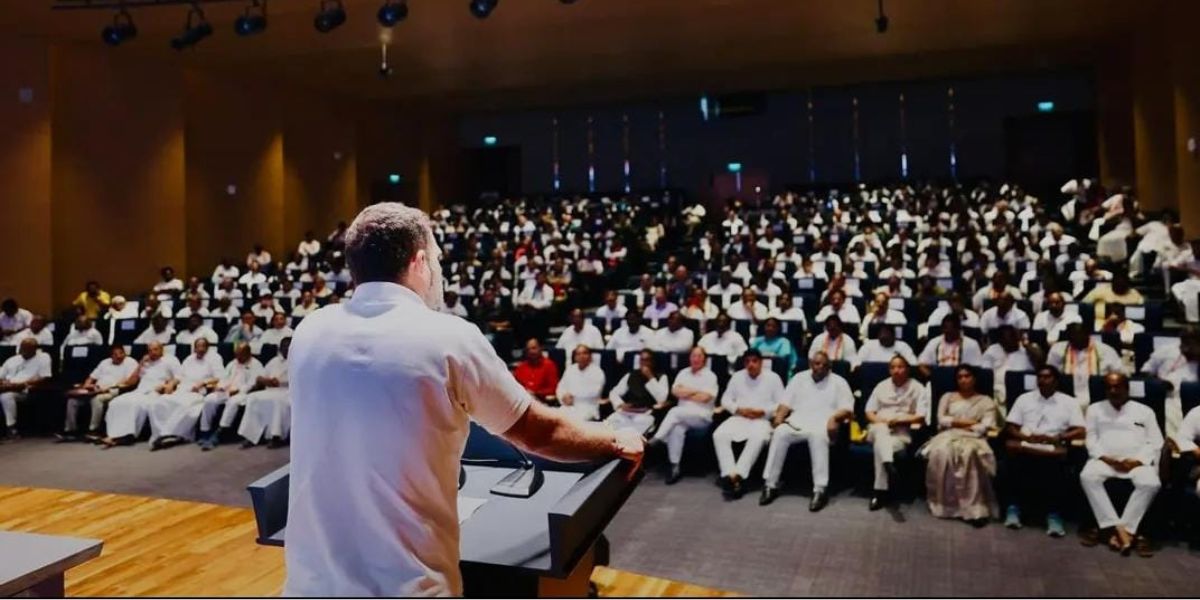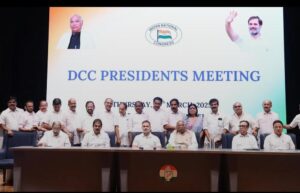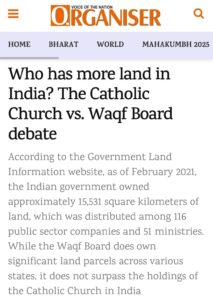Published Apr 06, 2025 | 2:29 PM ⚊ Updated Apr 06, 2025 | 2:29 PM

Rahul Gandhi addressing the DCC presidents at Indira Bhavan, New Delhi.
Synopsis: The Congress is likely to go into damage-control mode after taking a stand against the Waqf bill in the Parliament — a recalibrated power structure with enhanced Christian representation in key positions cannot be ruled out. The Church is allegedly frustrated with Congress MPs over a perceived betrayal of Christian interests in favour of Muslim vote-bank politics.
In Kerala’s intricately balanced political landscape, only a few communities wield as much electoral significance as the Christian community. Moreover, for the Congress-led UDF, the Christian vote is not just a numerical strength — it is a political lifeline.
The importance of this demographic always plays a vital role in its prospects, amid shifting alliances, ideological recalibration, and aggressive outreach by both Left and Right parties.
It is at this juncture that the Waqf (Amendment) Bill, 2025, which seeks to significantly reform the 1995 Waqf Act by enhancing the Union government’s regulatory authority over Waqf properties, was passed by the Parliament.
Of the many topics touched upon during discussions at the Lok Sabha and Rajya Sabha in connection with the bill, the Munambam land dispute was significantly stressed by the BJP.
It remains to be seen whether the stance of the Congress at the Parliament on this topic could become its “Waterloo” in Kerala, considering the upcoming local body polls and Assembly elections.
With talks of an organisational revamp gaining momentum, the Congress is likely to go into damage-control mode — a recalibrated power structure with enhanced Christian representation in key positions cannot be ruled out.
Meanwhile, Congress Working Committee (CWC) Member Ramesh Chennithala claimed that the Christian community would be the Sangh Parivar’s next target.
Highlighting a now-deleted article by the Rashtriya Swayamsevak Sangh (RSS) mouthpiece Organiser targeting Church-owned land, he said that the Sangh’s deep-rooted hatred towards minorities has become evident.
Christians constitute nearly 18.4 percent of Kerala’s population.
However, more than their population share, it is their geographic concentration and socio-political influence that makes them crucial players in the electoral arithmetic.
In districts such as Kottayam, Pathanamthitta, Idukki, Ernakulam and parts of Thrissur, Christians — particularly Roman and Syrian Catholics and other denominations — play a decisive role in determining the outcome of elections.
Several Assembly constituencies in these districts are considered bellwether seats, and their tilt often determines whether the Congress-led UDF can wrest or retain power.
Historically, the Congress has enjoyed the unwavering support of a large section of the Christian community, facilitated by the presence of powerful allies like the Kerala Congress (Mani) faction and a deep-rooted relationship with the Catholic Church and Christian-run institutions.
This support base ensured a steady vote bank for Congress. However, the Munambam issue has exposed a fault line.
The Church’s frustration with Congress MPs — who adhered to the party’s national line opposing the Waqf bill — stems from a perceived betrayal of Christian interests in favour of Muslim vote-bank politics.
The BJP has seized this opportunity, portraying Congress as duplicitous — appeasing Muslims while ignoring Christian grievances.
Celebrations in Munambam after the bill’s passage, marked by pro-BJP slogans and the joining of 50 residents (mostly ex-Congress and CPI(M) voters) to the BJP on 4 April 2025, signal a potential shift.
The Church-backed Deepika daily has further criticised Congress and the LDF for rejecting amendments to “anti-people sections” of the Waqf Act, amplifying the narrative of Congress’ double standards.
As the Congress prepares for a major restructuring of its state and district leadership ahead of the upcoming local body and assembly elections, there is growing pressure from within the party and its traditional support base to ensure better representation for the Christian community.
The move comes amid rising dissatisfaction among Church leaders and the Christian laity over what they perceive as the Congress’ waning commitment to addressing their concerns, especially after the absence of prominent leaders like AK Antony and Oommen Chandy who maintained close ties with the community.
In recent months, the Church has voiced its dismay over the marginal role played by Christian leaders in the current Congress leadership.
Sources in the party confirm that a revamp of the Kerala Pradesh Congress Committee (KPCC) is on the cards, with K Sudhakaran likely to be replaced as its president.
Several names, including Peravoor MLA Sunny Joseph, and Angamaly MLA Roji M John, are being considered for prominent roles.
Chalakudy MP Benny Behanan, along with MP Anto Antony and MLAs Mathew Kuzhalnadan and Roji M John, are also seen as key Christian faces in the Congress who could be elevated to leadership positions as part of the reshuffle.

DCC presidents from Kerala with Congress leaders.
The urgency for reorganisation has also been catalysed by the Church’s open criticism of Congress MPs who toed the party’s national line on the controversial Waqf Bill.
The Church views this as a betrayal of Christian interests in favour of appeasing the Muslim vote bank — a charge that the BJP has been quick to exploit.
With the BJP actively courting the Christian electorate and the Church’s growing disenchantment becoming more vocal, Congress leaders believe this is the ideal time to restructure and rebuild trust.
Party insiders say the upcoming revamp will focus not just on the KPCC president’s post but will also ensure that district-level leadership reflects the demographic and cultural realities of the state — including sufficient representation for Christians.
“The talks on revamp are there for some time now. Its essentiality has also been made aware to the central leadership. When to do that, how to do that, what equations will have to be carried out and other aspects rest with the central leadership. We also waiting for that,” a Congress leader told South First.
The Congress hopes that such a course correction will help stem the drift of Christian voters, many of whom feel politically orphaned.
At the same time, the BJP which has tactically positioned itself as the voice of Munambam’s residents, thereby the Christian community suffered a major setback as their narrative took a twist when Organiser published an article titled ‘Who has more land in India? The Catholic Church vs. Waqf Board debate’.

The article claimed that the Catholic Church held more land than the Waqf Board, suggesting that the Church’s land — allegedly acquired during British rule — should also be scrutinised. The article was later removed from the website after facing backlash.

The article has been removed.
Congress leaders seized this moment to expose what they see as the BJP-RSS’s real agenda.
Rahul Gandhi remarked that “it didn’t take long for the RSS to turn its attention to Christians,” while KPCC chief K Sudhakaran said the attack on Church property is in line with Golwalkar’s ideology in Bunch of Thoughts.
Leader of Opposition in the Kerala Assembly VD Satheesan asserted there was no link between the Waqf Amendment and Munambam, calling it a local issue resolvable in “ten minutes”.
He further added, “We warned that if the Waqf Bill is passed, the Church Bill will follow. The Christian community in Kerala is certain to identify wolves in sheep’s clothing. We will make them convinced about why the Congress and the INDIA Front took such a stand on the Waqf Bill.”
Chennithala said the now-withdrawn Organiser article had exposed the BJP’s true intent — first targeting Muslims, and now Christians.
“The article in the RSS mouthpiece Organiser, proves without doubt the chronology which the Sangh Parivar is going to take ! This comes in the wake of Wakf Amendment Act has made things crystal clear. The deep rooted hate towards minorities is for everyone to see. First they targeted the Muslims, now on to Christians ! The people of Kerala and this country must unite to fight the fascist regime and their mouthpieces unitedly,” Chennithala wrote on X.
The article in the RSS mouthpiece Organiser, proves without doubt the chronology which the Sangh Parivar is going to take ! This comes in the wake of Wakf Amendment Act has made things crystal clear. The deep rooted hate towards minorities is for everyone to see. First they… pic.twitter.com/HuDi3TXurJ
— Ramesh Chennithala (@chennithala) April 5, 2025
Meanwhile, political analyst Joseph C Mathew observed that the BJP’s attempt to use the Munambam issue to sway Christian votes nationally may not prove fruitful.
“The BJP’s attempt to link the Munambam land issue with the Waqf Bill might resonate locally but it’s unlikely to gain traction across the wider Christian community. However, the narrative around Muslim appeasement could have a deeper impact. There is a simmering undercurrent of anti-Muslim sentiment within sections of the Christian population — a shift that began with the controversial ‘love jihad’ discourse. What made it more potent was that it wasn’t just championed by right-wing groups, but found an echo within the Syro-Malabar Church hierarchy itself, sparking intense public debate,” Mathew told South First.
He added that the BJP sensed this as a political opening and began courting the Christian community with “unusual earnestness.”
On the Congress’ strategy of elevating Christian leaders to key positions, Mathew noted: “This is classic Congress-style appeasement politics. They’ve long known that even a marginal erosion in Christian support could tilt the balance in a tightly contested state like Kerala.”
With the local body and assembly polls fast approaching the Congress knew well that even a minuscule vote swing can redraw the electoral map. Also, with the BJP testing new waters, the Congress knows it can no longer afford to take its oldest allies for granted. Thus, recalibrating leadership, especially with the prospect of elevating Christian leaders to the helm is not just about reclaiming lost ground — it’s a survival strategy.
(Edited by Muhammed Fazil.)

